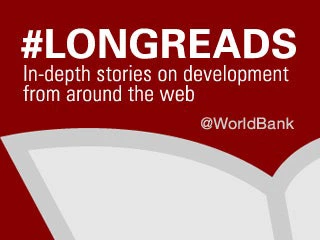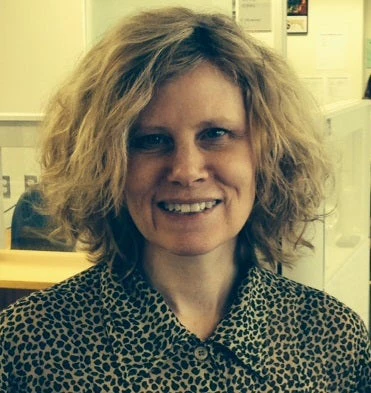Find a good longread on development? Tweet it to @worldbank with the hashtag #longreads.

A new study on mobile financial services and women by the GSMA mWomen Programme and Visa comes amid an explosion in mobile phone access in developing countries and addresses the issue of financial inclusion of women. “Unlocking the Potential” says women have been “consistently overlooked” as mobile operators, financial institutions, governments, and other service providers discuss how to develop mobile financial services. Yet women surveyed in Indonesia, Kenya, Pakistan, Papua New Guinea and Tanzania actively contribute to household income (75%) and manage household finances (nearly 60% save money for daily expenses or long-term needs and a third pay utility or other household bills). In Kenya, where Safaricom’s M-PESA service has been widely adopted, 95% of women surveyed said they recognize the “security and privacy of mobile money,” according to a Visa Viewpoints blog.
CNN’s story about the rare tropical disease river blindness was tweeted more than 1,100 times and has picked up nearly 600 comments. More than 18 million people—99% in Africa—live with this nonfatal but miserable disease that can cause intense itching, blindness and skin conditions that result in victims being treated as outcasts. The story describes efforts to treat the disease, control the parasites that cause it, and ultimately to improve the lives of its victims.
In “We Aren’t the World,” journalist and author Ethan Watters writes about research that challenges long-held beliefs about the universality of human behavior and has implications for international relations and development. The story centers on three researchers (Joseph Henrich, Steven Heine and Ara Norenzayan) at the University of British Columbia whose 2010 paper, The Weirdest People in the World (pdf), would “fundamentally challenge the way social scientists thought about human behavior, cognition, and culture.” Basically, “People are not ‘plug and play,’” Watters writes, quoting Henrich, “…you cannot expect to drop a Western court system or form of government into another culture and expect it to work as it does back home.”
RTCC: Can Graphene Drive the Green Economy?
“It’s strong as diamond, flexible as rubber, it conducts electricity and can heal itself when damaged, but are there any uses for graphene that could help us reduce our greenhouse gas emissions? “
GSMA: Unlocking the Potential: Women and Mobile Financial Services in Emerging Markets
“This February 2013 report offers insights on women’s needs for financial management tools and use of mobile financial services in Indonesia, Kenya, Pakistan, Papua New Guinea and Tanzania. It also contains implications for action for mobile financial service providers in any emerging market.”
CNN: With River Blindness, 'You Never Sleep'
“About 18 million people have river blindness worldwide, according to the World Health Organization, but more than 99% of cases of this disease are found in Africa.”
Pacific Standard: We Aren’t the World
“Joe Henrich and his colleagues are shaking the foundations of psychology and economics—and hoping to change the way social scientists think about human behavior and culture."
Longreads is a regular feature on the Voices blog highlighting development research and in-depth reporting.


Join the Conversation